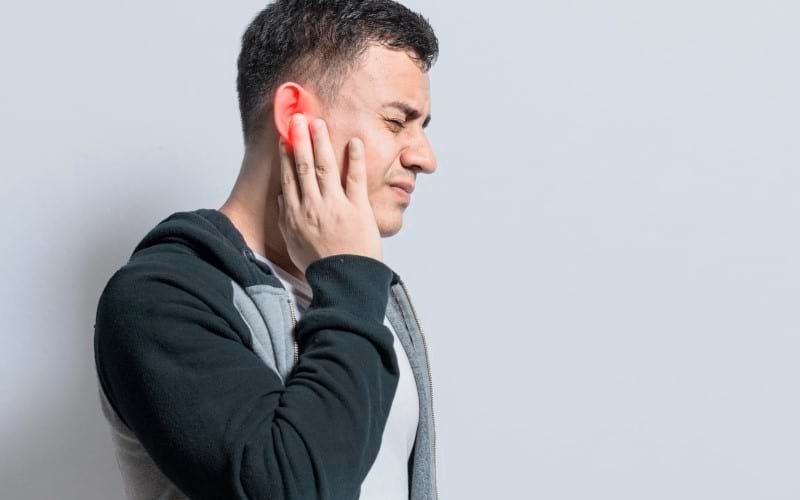In most cases, when the mouth pulls to one side suddenly when talking, it turns out to be Bell’s palsy. The condition may be associated with a weak facial feeling on the affected side accompanied by ear or jaw pain. Other causes that could be potential causes include mentalis strain or a stroke.
Sometimes, you may notice your mouth pulling to one side when talking. If this happens, it could be a temporary condition that rectifies in a short while.
If it persists, then it could be that you suffer from Bell’s palsy or stroke.
Bell’s palsy, or acute facial palsy, occurs when your facial muscles get weak or paralyzed.
A stroke may also affect you by making your mouth pull to one side when talking. This article explores the causes behind the mouth pulling to one side when talking.
Why does my mouth pull to one side when talking? Is it Bell’s palsy?
Bell’s palsy is the primary cause of facial muscles weakening, causing the mouth to pull to one side.
Acute facial palsy of unknown cause occurs when facial muscles become paralyzed or weak on one side. Often, this condition affects one side making it stiff and drop.
The facial nerve controls our facial muscles. But when you suffer from trauma on a nerve called the seventh cranial nerve, it leads to suffering from Bell’s palsy.
Most people who have diabetes or viral infections may develop this condition.
What are the symptoms of Bell’s palsy?
Although symptoms of Bell’s may resemble those of stroke, these two diseases prove very different.
Symptoms of Bell’s palsy don’t show as those of other diseases. You may wake up, have a great day, and sleep only to wake up with your mouth pulling to one side.
You may get some weakness on one side of your face, which drops and pulls on one side. The weakness on one side of your face makes it hard to make facial expressions or close your eye.

If you experience these symptoms with a pull on one side of the mouth, you could be in the early stages of Bell’s palsy.
The symptoms get worse within the first 24 to 48 hours.
In some rare cases, Bell’s palsy affects both sides of your face. You may get these symptoms on both sides due to extensive facial nerve damage.
The primary symptoms that accompany facial paralysis include the following:
- A person may drool
- A jaw or ear pain on the affected side and the pain behind the ear happens one to two days before your face gets weak and paralyzed.
- The sense of taste deteriorates and worsens with worsening symptoms.
- You may experience a recurring headache before and during the paralysis stage.
- The eyes and mouth get dry.
- This condition makes you hear a ringing in your eyes, known as tinnitus.
- You may develop sensitivity to sound. Days before, the symptoms get noticeable, and the sound may seem louder than it might be. Sometimes, the sounds and noises spike a headache.
- Talking becomes a struggle. Before the condition strikes, the muscles on your face start to paralyze. As the paralysis sets in, you may find talking strenuous and difficult to strike up a conversation. This symptom goes hand in hand with other symptoms before your mouth gets pulled to one side.
- You may experience trouble eating or drinking. As the muscles get weaker, chewing and swallowing get affected. The jaw on the affected side becomes painful, making eating strenuous.
These symptoms occur as the disease has set in and may take longer to go away. Most people get relief from the symptoms within three weeks or months after they appear.
Some people, in rare cases, develop permanent symptoms associated with Bell’s palsy.
What causes Bell’s palsy?
Bell’s palsy is a swelling resulting from damage to the facial nerve. Most viral infections like herpes simplex one cause damage to this nerve.
This nerve, located on a narrow area within the skull, swells and causes pressure on this area. The bony structure doesn’t allow for swelling hence damaging the nerve.
Who is most vulnerable to Bell’s palsy?
This condition often affects people from the age of 15 to 60 years. All people, men, and women, stand a chance of suffering from Bell’s palsy.
However, it affects most women who may suffer from this condition during their last trimester.
Also, you may suffer from Bell’s palsy the first week after giving birth.
For this reason, if you get Bell’s palsy symptoms during and after pregnancy, get checked by your doctor immediately.
You stand a high risk of suffering from Bell’s palsy if you suffer from the following health conditions:
- A virus causing respiratory conditions named Adenovirus
- Hand-foot-mouth disease
- Epstein-Barr
- Herpes Zoster
- Which causes chickenpox
- Flue (Influenza B)
- German measles or Rubella
- Mumps
- Auto-immune diseases
- High blood pressure
What other conditions may make your mouth pull to one side when talking?
Mentalis strain
Mentalis strain causes the lips not to close, causing lip incompetence.
When teeth protrude more on one upper side of the mouth, the mouth may pull to one side when talking.
This condition doesn’t come with any accompanying symptoms causing pain or discomfort.
Dental rectification may align the teeth making it easier to close the mouth without pulling to the side.
Stroke

Brain attack or stroke results from blood not reaching the brain due to a vessel block or blood vessel burst.
When this happens, it may lead to brain and nerve damage. The nerve damage causes the mouth to pull to one side if the facial nerve gets damaged.
Stroke differentiates from Bell’s palsy in that stroke affects other body parts, but Bell’s palsy doesn’t.
For Bell’s palsy, only the facial nerve gets damaged, and symptoms are limited to the face.
A stroke also causes more severe complications than Bell’s palsy. Many stroke cases even result in death.
Symptoms of stroke include the following:
- Weakness and numbness on the face, leg, and arm
- The confusion which causes understanding and making speech difficulty
- You find it difficult to see with one or both eyes
- Dizziness
- Walking becomes difficult
- Severe headache
- Trouble finding your balance
If you get these symptoms, call 911 or visit a hospital immediately.
FAQs
Why does my lip curl when I talk?
If the curling has no associated symptoms of weakness, numbness, or ear/jaw pain, it could be muscle spasms. Muscle spasms have no health effects and disappear after a short time.
What is Moebius syndrome?
This disease refers to a condition where one is born lacking the sixth and seventh cranial nerves. This defect results in difficulty controlling eye movements and facial expression
What can mimic Bell’s palsy?
Most often, stroke may mimic Bell’s palsy
Conclusion
When you suddenly notice your mouth pulling to the side when talking, visit your doctor immediately or call 911.
You could have Bell’s palsy or, even worse, a stroke. We recommend quick medical attention to rule out the cause for better treatment and adequate medical care.


